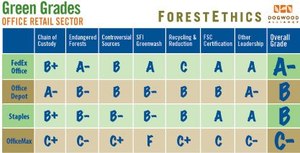Domtar's Two Sides of the Atlantic
News came this week that Domtar has become the first North American company to join the Two Sides campaign, a UK based organization funded by some in the industry to promote wasteful consumption of paper products, more costly ways of doing business, such as its active campaign to eliminate the "don't print" reminder at the bottom of emails. Its not exactly the kind of leadership our "paper planet" needs.
Its unfortunate, because apart from its aversion to recycled fiber content, Domtar is generally regarded as an environmentally conscientious company, and has been a leader in many ways in the past decade. The Two Sides campaign on the other hand, actively promotes a fairly outdated perspective and anti-conservation views. On its webpage, for example, under its Q and A, is included a question stating,
"When they promote the use of FSC/PEFC automatic they send a negative message to the general public, because it appears that all remaining fibers are not completely sustainable." and the
Two Sides answer is, "I quite agree. It is Two Sides' ambition to ensure that public perception now sees print media as a natural product that can be used with complete confidence."
Don't think, just print. Don't be efficient, just print. Don't consider your brand, just print. That seems to be the message.
No one can blame Domtar or other companies for wanting to sell paper (in Europe), and make a living. But the Paper Planet would like to encourage Domtar to step back and consider an approach we believe will be more effective, and save everyone a lot of money and healthy forests.
Even conservationists recognize paper's got a lot going for it, and plays an important role in our lives. Just like digital devices, paper isn't going to vanish from our lives, and shouldn't. But encouraging wastefulness will never fly, it will never be leadership. Could it be that the industry would find more success through authentic environmental responsibility and by selling paper's unique characteristics, experience and applications, rather than marketing wastefulness to simply increase volume and number of units sold?
The essay, Paper, Paper, Skin and Body, by David Barringer on paper's virtues and its affect on us in our lives, offers a window for inspiration. It is obviously art, poetry, not marketing, but it gives an insight into how to highlight the unique attributes and experience that comes from paper, and lead us to value it more. It is through this higher value for paper, which includes incorporating transparent, authentic responsibility to the people and the land where it comes from, that there is opportunity for a viable paper industry in the unavoidable reality of decreasing consumption in developed countries.
.jpg)














